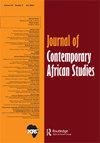Ethiopia in Mengistu’s Final Year: Until the Last Bullet
IF 0.8
Q2 AREA STUDIES
引用次数: 0
Abstract
structural space for gender and social justice (435–436). There is a close link between identity politics and infrastructural politics in the material and physical space of the university, which can order and control different publics, as well as influence emotions of acceptance and comfortability in thinking of university as ‘home’. This metaphor of university as a home shows how the infrastructure of HEI is accountable for social cohesion and discriminative social organisations. The only weakness of the book is that it is overflowing with information, which makes it difficult to understand the thread that runs throughout the chapters. However, the heavy read is justified by the book’s twin focus on transformation in South African universities, and what this means for schools. The book shows that transforming and ‘decolonising’ curriculums between universities and schools means to pay attention to language policies and infrastructural politics. The book argues for a ‘thick transformation’ that is not only deeprooted and all-inclusive in education but also in housing, business, sport, and transportation (59). Transformation needs transparent communication and political participation for structural and systematic change. Amid the Covid-19 pandemic, the inaccessibility and inequality in online education and classroom learning has shown the need for transforming universities and schools. This novel hybrid pedagogy of both online and classroom education shows how inaccessibility can be resolved through envisioning the goal of transforming education, thereby revolutionising the South African schooling system.孟格斯图最后一年的埃塞俄比亚:直到最后一颗子弹
促进性别和社会正义的结构空间(435-436)。在大学的物质和物理空间中,身份政治与基础设施政治之间存在着密切的联系,这可以命令和控制不同的公众,也可以影响将大学视为“家”的接受和舒适情绪。这种将大学比喻为家的比喻表明,高等教育的基础设施如何对社会凝聚力和歧视性社会组织负责。这本书唯一的缺点是信息量太大,让人很难理解贯穿各章的主线。然而,这本书的两个重点是南非大学的转型,以及这对学校的意义,这是合理的。这本书表明,大学和学校之间的课程改革和“去殖民化”意味着要关注语言政策和基础设施政治。该书主张进行一场“深度转型”,不仅在教育领域,而且在住房、商业、体育和交通领域都要进行“深度转型”。转型需要透明的沟通和政治参与,以实现结构性和系统性变革。在2019冠状病毒病大流行期间,在线教育和课堂学习的不可访问性和不平等表明了大学和学校改革的必要性。这种在线和课堂教育的新型混合教学法展示了如何通过设想改变教育的目标来解决无障碍问题,从而彻底改变南非的学校制度。
本文章由计算机程序翻译,如有差异,请以英文原文为准。
求助全文
约1分钟内获得全文
求助全文
来源期刊

Journal of Contemporary African Studies
AREA STUDIES-
CiteScore
2.20
自引率
0.00%
发文量
18
期刊介绍:
Journal of Contemporary African Studies (JCAS) is an interdisciplinary journal seeking to promote an African-centred scholarly understanding of societies on the continent and their location within the global political economy. Its scope extends across a wide range of social science and humanities disciplines with topics covered including, but not limited to, culture, development, education, environmental questions, gender, government, labour, land, leadership, political economy politics, social movements, sociology of knowledge and welfare. JCAS welcomes contributions reviewing general trends in the academic literature with a specific focus on debates and developments in Africa as part of a broader aim of contributing towards the development of viable communities of African scholarship. The journal publishes original research articles, book reviews, notes from the field, debates, research reports and occasional review essays. It also publishes special issues and welcomes proposals for new topics. JCAS is published four times a year, in January, April, July and October.
 求助内容:
求助内容: 应助结果提醒方式:
应助结果提醒方式:


